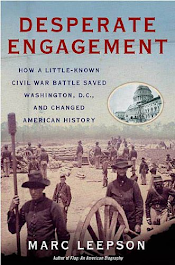A lot happened between July 9th and the 12th in 1864. Marc Leepson has made this short period of the Civil War the focus of his book Desperate Engagement: How a Little-Known Civil War Battle Saved Washington D. C., and Changed American History.
In the end, the battle changes little other than perhaps delaying the end of the war. General Grant continued his stranglehold on the Confederate Army surrounding Richmond until Lee surrendered at Appomattox. Nonetheless, if the Hail Mary pass had been completed and General Jubal Early had sacked Washington, we might be all speaking with a Southern accent.
It was close. Heart-stopping close.
The risky moves and countermoves, potential payoff, and unbridled heroism on both sides should have made this an exciting book. The Battle of Monocacy and attempted siege are nicely covered in about four or five chapters with the remaining chapters filled mostly with letters and memoirs of the participants, asides, or research factoids. Civil War buffs should find even the trivia interesting, but a casual reader might view much of this text as fill.

